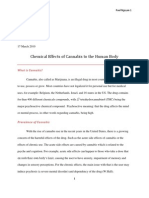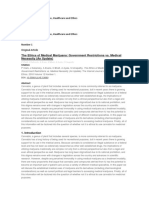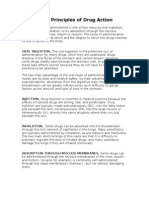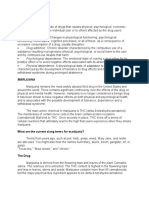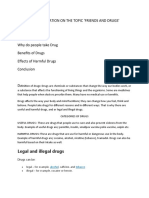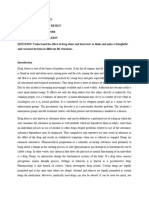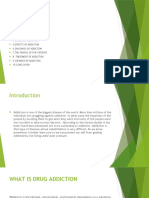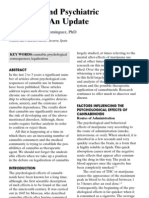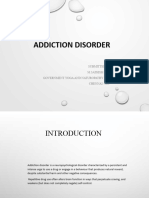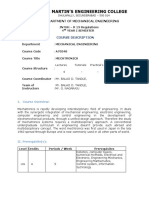Draft 1
Draft 1
Uploaded by
PaulCopyright:
Available Formats
Draft 1
Draft 1
Uploaded by
PaulCopyright
Available Formats
Share this document
Did you find this document useful?
Is this content inappropriate?
Copyright:
Available Formats
Draft 1
Draft 1
Uploaded by
PaulCopyright:
Available Formats
Nguyen 1
Paul Nguyen Professor Jan Rieman English 1102 3/1/12
Chemical Effects of Cannabis to the Human Body
What is Cannabis? Cannabis, also called as Marijuana, is an illegal drug in most countries, where it is illegal to use, possess or grow. Most countries have not legalized it for personal use but for medical uses, for example: Belgium, the Netherlands, Israel, and 16 states in the US. The drug contains for than 400 different chemicals compounds, with 9-tetrahydrocannabinol (THC) being the major psychoactive chemical compound. Psychoactive meaning: that the drug affects the mind or mental process, in other words regarding cannabis, being high. Prevalence of Cannabis With the rise of cannabis use in the recent years in the United States, there is a growing concern of the harmful effects of the drug. Such as the acute side effects of cannabis or the effects of chronic use. The acute side effects are caused by cannabis which is related to the psyche and cognition. For example, acute side effects can happen to those who take a dose that exceeds their own bodys limit, causing the user to have anxiety, impairment of memory and changes in sensory perceptions. For the chronic effects, the main issue with that is the user may induce psychosis (a severe mental disorder) and dependency of the drug (W.Hall).
Nguyen 2
General Physical Effects on the Body Most of the effects of cannabis are caused by the chemical compound THC. It produces reversible tachycardia with the increase of cardiac labor and the demand of oxygen, and also the increase of blood pressure with the decrease in parasympathetic (deals with the nervous system) tone (S.C. Clark). For those who are chronic users, THC can lead to bradycardia, which is the slowness of the heart rate, usually fewer than 60 beats per minute (R.T. Jones). At higher dosage, dilation of the blood vessels can increase, causing dizziness and reddening. Other effects that THC offers are the effect on salivary glands and pupils and muscles. For the salivary glands, hypo salivation and dry mouth can happen. For the pupils, the reaction to light is slowed and tear flow is also decreased. With both of these effects in the mouth and eyes, there can be a potential increase in risk for infections in eye and respiratory tract. As for muscles, they are in a relaxed state, which causes the reduction in strength and impaired coordination. This could lead into possible falls or stumbling while walking. Tolerance The human body can develop tolerance to the effect of cannabis. In a study, Jones and Benowitz administer daily doses of 210 mg of oral dronabinol (synthesized THC) to 120 volunteers for 11-20 days. The volunteers did indeed develop a tolerance to the impairments and the psychological high by the end of the study. But then again, this was a controlled dosage of THC. The effects are related to the psyche of the body, so if the dosage was larger than what the body can handle, the user will show signs of symptoms. With tolerance, the effects of cannabis are dose-dependent.
Nguyen 3
Accidents Involving Cannabis The chemical THC, which is in cannabis, can impair vision, psychomotor performance, and the cognitive functions. In other words, the user is in a relax state with their ability to do simple things are decreased. If the user is driving, this can greatly increase the risk of causing a traffic accident. After alcohol, cannabis is most frequently found in impaired drivers and drivers that are involved in accidents. Then again, cannabis effects depend on dose, psyche, and tolerance ranging from not much effect to a strong effect. Studies estimate that acute cannabis uses can double the risk of causing an accident (R.K. Jones), while regular users, with higher tolerance, who are acutely intoxicated, seem to have no increased risks. (F.Grotenhurman). Another study found that regular cannabis users showed lower scores of dizziness and increased cognitive abilities, more than those who are not regular users (O.Drummer). Depression Cannabis and THC may cause anxiety and depression but it also help with these symptoms. Cannabis is often used to relieve psychological problems and those who suffer diseases dealing with the body. For depression, clinical studies observed that cannabis had an anti-depressive effect. Young Cannabis Smokers This topic should already be inferred, but the use of cannabis by young people may have a negative effect on their body, such as mental health, since the body has not fully developed yet. In a study called Dunedin study, a long-term study in New Zealand, between cannabis and mental health problems was observed. This was a study about the use of cannabis by young people. It was concluded that people at the age of 18 had a higher risk of mental illness than
3
Nguyen 4
those who are at the age of 21. Also the use of the drug and mental illness was linked to the persons socioeconomic status, and behavior problems. Problems for Chronic Users Even though heavy chronic users may have high tolerance for the effects of the drug, they still have problems. Depending on the intensity and duration of use, they can still show impairments of memory, attention, and ability to organize complex information. The possible explanations of these effects are influence by the chemical of cannabis. It causes cerebrovascular resistance, making blood flow difficult from one area to another in the body. Other Organ Systems Long term effects of smoking cannabis can also have a negative health effect on other systems in body, such as the immune system and circulation system. The THC causes a certain cells in the body to not correctly develop, like Th1 and Th2 cells. These are a type of white blood cells that maximizes and establish the capabilities of the immune system. The THC in the drug also cause a lot of decreases in cells and chemicals that the body needs, but cannabis also help with inflammatory diseases such as Crohns disease but it has a negative effect on other diseases such as AIDs and cancer. In a three-week clinical study, HIV positive adults smoked cannabis and THC showed no beneficiary results were shown. Cardiac arrest is another risk from smoking cannabis due to the effect on blood pressure and heart frequency. That means that there is an abnormal blood circulation due to the failure of the heart to contract correctly.
Nguyen 5
Hormonal Systems Due to cannabis and the chemical THC acting on the hypothalamic pituitary adrenal axis, a large number of endocrine processes were caused by the drug, as a result, affecting sexual and other hormones as well as glucose metabolism (L. Murphy). The changes in human hormones levels were due to the effects of acute cannabis or THC ingestion, but those effects were very minor (L.E. Hollister). Tolerance can be built to these effects, but there was a study on male fertility. After several weeks of smoking 8-10 cannabis cigarettes, a slight decrease in sperm
You might also like
- Chapter Four - Drug and Substance AbuseDocument49 pagesChapter Four - Drug and Substance AbuseBiruk Shiferaw100% (1)
- Radar Theory For Area Approach Radar ControllersDocument38 pagesRadar Theory For Area Approach Radar ControllersMegheDhakaRodNo ratings yet
- Buku PKB 75 PDFDocument35 pagesBuku PKB 75 PDFLissaberti AmaliahNo ratings yet
- 233 2 V Example 13.23.: C B BC BCDocument9 pages233 2 V Example 13.23.: C B BC BCmuhammad haseebNo ratings yet
- Chemical Effects of Cannabis To The Human BodyDocument7 pagesChemical Effects of Cannabis To The Human BodyPaulNo ratings yet
- Inquiry Project FinalDocument9 pagesInquiry Project FinalPaulNo ratings yet
- Chemical Effects of Cannabis To The Human BodyDocument9 pagesChemical Effects of Cannabis To The Human BodyPaulNo ratings yet
- Mariguana InformationDocument8 pagesMariguana InformationAlberto Aguirre SanchesNo ratings yet
- The Ethics of Medical Marijuana Government Restrictions vs. Medical Necessity - An UpdateDocument12 pagesThe Ethics of Medical Marijuana Government Restrictions vs. Medical Necessity - An UpdateAle PicadoNo ratings yet
- Mental Health 2Document45 pagesMental Health 2Shahnaz AhmedNo ratings yet
- Substance Abuse: Substance Abuse, Also Known As Drug Abuse, Refers To A MaladaptiveDocument10 pagesSubstance Abuse: Substance Abuse, Also Known As Drug Abuse, Refers To A MaladaptiveOyedotun TundeNo ratings yet
- Medical Marijuana Reference Note CardsDocument21 pagesMedical Marijuana Reference Note CardsJayson KarunaNo ratings yet
- Cannabis (Marijuana) Research ReportDocument39 pagesCannabis (Marijuana) Research ReportDumitru-Mihai TabacNo ratings yet
- Basic Principles of Drug ActionDocument8 pagesBasic Principles of Drug ActionGab PinedaNo ratings yet
- Disadvantages of Using Illegal Drugs in Your LifeDocument6 pagesDisadvantages of Using Illegal Drugs in Your LifeJohnpaul FolleroNo ratings yet
- Definitions: MarijuanaDocument4 pagesDefinitions: MarijuanaJanine Panuelos DolzNo ratings yet
- How Does MarijuanaDocument5 pagesHow Does MarijuanaNoviana AndrianiNo ratings yet
- Presentation On The TopicDocument7 pagesPresentation On The TopicMario SantosNo ratings yet
- World Health Organization - Cannabis UseDocument11 pagesWorld Health Organization - Cannabis UseEtienne BellemareNo ratings yet
- Aisha AssignmentDocument5 pagesAisha AssignmentUmar Bello UmarNo ratings yet
- Argument: Marijuana Can Affect The Development of The BrainDocument6 pagesArgument: Marijuana Can Affect The Development of The Brainjomarikent_941486077No ratings yet
- Why Marijuana Must Remain IllegalizedDocument3 pagesWhy Marijuana Must Remain IllegalizedMOHD FITRI SAIMINo ratings yet
- BiologyDocument21 pagesBiologypraveen godara100% (1)
- Can Drug Use Contribute To A PersonDocument3 pagesCan Drug Use Contribute To A PersonRama MalkawiNo ratings yet
- Cannabis Effect On Mental HealthDocument5 pagesCannabis Effect On Mental Healthammaramaryam6463No ratings yet
- Opposing ViewpointsDocument3 pagesOpposing Viewpointsapi-548161271No ratings yet
- Effects of DrugsDocument5 pagesEffects of DrugsTom Rico DivinaflorNo ratings yet
- Marijuana - The Benefits and DisadvantagesDocument10 pagesMarijuana - The Benefits and DisadvantagesPojangZaliNo ratings yet
- Drug AddictionDocument23 pagesDrug AddictionsjvNo ratings yet
- Essay: Should Marijuana Be Legalized?Document3 pagesEssay: Should Marijuana Be Legalized?Vale VigourouxNo ratings yet
- Research Paper On Illegal Drugs PDFDocument4 pagesResearch Paper On Illegal Drugs PDFPoole JNo ratings yet
- Psychoactive DrugsDocument14 pagesPsychoactive DrugspoopooNo ratings yet
- Physical Impact of Drugs: Misuse and AbuseDocument7 pagesPhysical Impact of Drugs: Misuse and AbuseAbi GailNo ratings yet
- Marijuana Use by Adolescents: An Orgonomic PerspectiveDocument9 pagesMarijuana Use by Adolescents: An Orgonomic PerspectiveC.K.No ratings yet
- MARIJUANADocument10 pagesMARIJUANARaudhatul JannahNo ratings yet
- How Marijuana Affects The MindDocument3 pagesHow Marijuana Affects The MindRobert Edwards100% (1)
- NIDA Drug FactsDocument4 pagesNIDA Drug FactsmediasaladNo ratings yet
- Legalization of Marijuana For Medical Purposes in The PhilippinesDocument21 pagesLegalization of Marijuana For Medical Purposes in The PhilippinesChristopher YuNo ratings yet
- Cannabis and Psychiatric PathologyDocument9 pagesCannabis and Psychiatric PathologyDaniela Jacob PintoNo ratings yet
- Cannabis Use Disorder DoneDocument8 pagesCannabis Use Disorder Doneapi-333107914No ratings yet
- Good Drugs, Bad Drugs: Drug EducationDocument13 pagesGood Drugs, Bad Drugs: Drug EducationMarielle ZanduetaNo ratings yet
- Recreational Drug Use DissertationDocument7 pagesRecreational Drug Use DissertationBuyThesisPaperSingapore100% (1)
- Gone To Pot - A Review of The Association Between Cannabis and PsychosisDocument24 pagesGone To Pot - A Review of The Association Between Cannabis and PsychosisStephan LewisNo ratings yet
- The Positive and Negative Effects of Marijuana To HumanDocument23 pagesThe Positive and Negative Effects of Marijuana To HumanMayeiaElenorNo ratings yet
- Drug Addiction DraftDocument16 pagesDrug Addiction Draftnivedhakp123No ratings yet
- Mental Health Assnt 2Document10 pagesMental Health Assnt 2Barnabas KipngetichNo ratings yet
- Smoking Marijuana: (Course Title)Document6 pagesSmoking Marijuana: (Course Title)RomeelNo ratings yet
- Lecture On DrugsDocument54 pagesLecture On DrugsAmii'iel LescanoNo ratings yet
- Drug Abuse and Addiction Affect Hispanic Families in The United StatesDocument6 pagesDrug Abuse and Addiction Affect Hispanic Families in The United StatesJorge Yeshayahu Gonzales-LaraNo ratings yet
- Addiction DisordersDocument32 pagesAddiction Disordersgideon gideonNo ratings yet
- Prepared By: Padmaja Shandilya Roll - No.19 Subject: Biology Submitted To: Sapna MamDocument17 pagesPrepared By: Padmaja Shandilya Roll - No.19 Subject: Biology Submitted To: Sapna MamTHE TALKIESNo ratings yet
- Gateway DrugsDocument6 pagesGateway DrugsMaynard Pascual100% (1)
- Biology ProjectDocument16 pagesBiology ProjectInfantNo ratings yet
- AnethDocument20 pagesAnethAndrewGutierrezFloresNo ratings yet
- Research Essay Paper 2Document10 pagesResearch Essay Paper 2api-509559179No ratings yet
- Central Nervous System StimulantsDocument83 pagesCentral Nervous System Stimulantskiran mahal100% (1)
- Marijuana: Billyr - Martin Williaml - Dewey VincenzodimarzoDocument14 pagesMarijuana: Billyr - Martin Williaml - Dewey Vincenzodimarzostein godoy pachecoNo ratings yet
- Many Theories For Causes of Drug AddictionDocument8 pagesMany Theories For Causes of Drug AddictionPatrick ZwinglyNo ratings yet
- Compact Spinning SystemDocument6 pagesCompact Spinning SystemIshan MehtaNo ratings yet
- Air Insulated Switchgear Up To 24 KVDocument108 pagesAir Insulated Switchgear Up To 24 KVRahil TasawarNo ratings yet
- Waves - Edited Version - AlevelDocument6 pagesWaves - Edited Version - AlevelBobby BichumNo ratings yet
- Type CDG 11 Overcurrent and Earthfault RelayDocument8 pagesType CDG 11 Overcurrent and Earthfault RelayArun KumarNo ratings yet
- Nando DNV MDRDocument7 pagesNando DNV MDRrakesh marwahNo ratings yet
- DeMimPraVocê - American Pie-Don McLeanDocument8 pagesDeMimPraVocê - American Pie-Don McLeanFernanda RelvaNo ratings yet
- Vision VAM 2020 (Ethics) Contributions of Moral ThinkersDocument46 pagesVision VAM 2020 (Ethics) Contributions of Moral ThinkersprotonadvancedNo ratings yet
- Oral Habits and Its Relationship To Malocclusion A Review.20141212083000Document4 pagesOral Habits and Its Relationship To Malocclusion A Review.20141212083000Stacia AnastashaNo ratings yet
- Package N 16A: UNIT - 6390 Etp InterconnectionDocument5 pagesPackage N 16A: UNIT - 6390 Etp InterconnectionPrasadNo ratings yet
- MechatronicsDocument9 pagesMechatronicsjahnaviNo ratings yet
- Datasheet Tensite Batteries Lithium 200Document3 pagesDatasheet Tensite Batteries Lithium 200Jarrea CampillosNo ratings yet
- Program of Works: 02 QuirinoDocument14 pagesProgram of Works: 02 QuirinoAYSON N. DELA CRUZNo ratings yet
- Science Focus Homework Book 3 AnswersDocument7 pagesScience Focus Homework Book 3 Answersh02rj3ek50% (2)
- Form Rab Ruang Icu 2024Document96 pagesForm Rab Ruang Icu 2024piusNo ratings yet
- UntitledDocument1 pageUntitledParashNo ratings yet
- Surya MudraDocument2 pagesSurya Mudrahema decNo ratings yet
- THE TALL DARK MAN © (Screenplay)Document81 pagesTHE TALL DARK MAN © (Screenplay)Dick CroyNo ratings yet
- Mix of Docs Might Be Useful For Some.Document51 pagesMix of Docs Might Be Useful For Some.Captain 737No ratings yet
- Generate 3d Idf Data enDocument3 pagesGenerate 3d Idf Data engobinathNo ratings yet
- Treating and Beating Anxiety and DepressionDocument7 pagesTreating and Beating Anxiety and DepressiondrrodgermNo ratings yet
- Flynn's ClassificationDocument46 pagesFlynn's ClassificationmasumiNo ratings yet
- Consolidation Test - 023Document11 pagesConsolidation Test - 023nepster620533% (3)
- Wise Gis GuidanceDocument81 pagesWise Gis GuidanceLasiminBinSuhadiNo ratings yet
- Overview ModulesDocument3 pagesOverview Modulestruba2No ratings yet
- A Review On Pre-Engineered Building Design of An Industrial WarehouseDocument6 pagesA Review On Pre-Engineered Building Design of An Industrial WarehouseUGCJOURNAL PUBLICATIONNo ratings yet
- Activity 3.3Document10 pagesActivity 3.3jeldin bernasNo ratings yet
- Menanyakan Tujuan Penulisan TeksDocument23 pagesMenanyakan Tujuan Penulisan TeksEddii KarrtonooNo ratings yet




